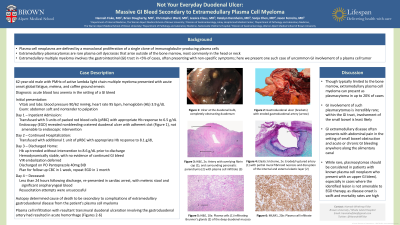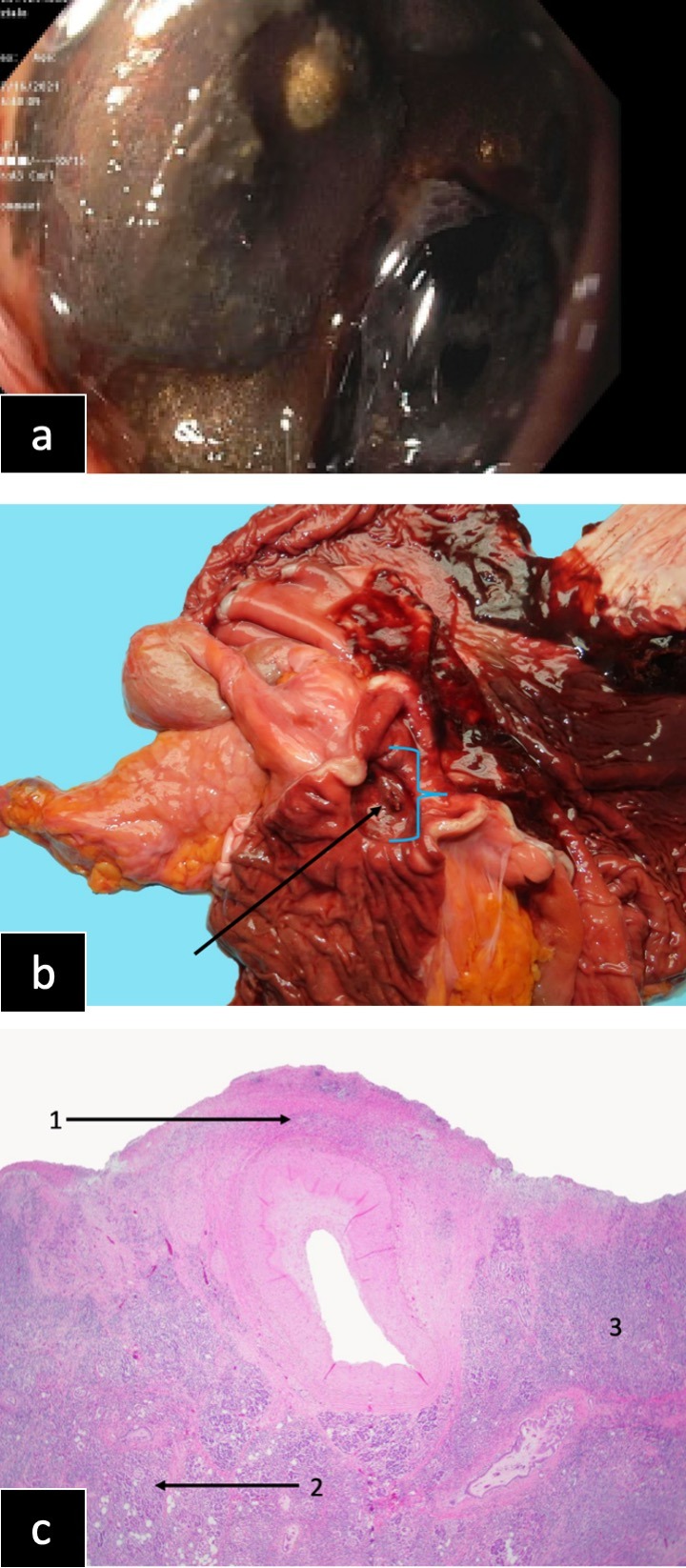Back


Poster Session A - Sunday Afternoon
Category: GI Bleeding
A0324 - Not Your Everyday Duodenal Ulcer: Massive GI Bleed Secondary to Extramedullary Plasma Cell Myeloma
Sunday, October 23, 2022
5:00 PM – 7:00 PM ET
Location: Crown Ballroom

Has Audio

Hannah W. Fiske, MD
Brown University/Rhode Island Hospital
Providence, RI
Presenting Author(s)
Award: Presidential Poster Award
Hannah W. Fiske, MD1, Christopher Ward, MBBS2, Brian Dougherty, MD, MSc3, Jessica Claus, MD4, Katelyn Dannheim, MD5, Sonja Chen, MBBS6, Jason Ferreira, MD7
1Brown University/Rhode Island Hospital, Providence, RI; 2Warren Alpert Medical School of Brown University, East Providence, RI; 3Brown University, Providence, RI; 4Lifespan/ Rhode Island Hospital/ Warren Alpert Medical School of Brown University, Providence, RI; 5Rhode Island and Hasbro Children's Hospitals and the Warren Alpert Medical School of Brown University, Providence, RI; 6Nationwide Children's Hospital, Columbus, OH; 7Brown University/University Gastroenterology, Providence, RI
Introduction: Plasma cell neoplasms are defined by a monoclonal proliferation of a single clone of immunoglobulin producing plasma cells. Extramedullary plasmacytomas are rare plasma cell dyscrasias that arise outside of the bone marrow, most commonly in the head or neck. Extramedullary multiple myeloma (MM) involves the gastrointestinal (GI) tract in < 5% of cases, and often presents with non-specific symptoms. Here we discuss one such case of uncommon GI involvement of a plasma cell tumor.
Case Description/Methods: A 62-year-old male with active lambda light chain MM presented with global fatigue, melena, and hematemesis. Initial vitals included blood pressure 90/62 mmHg and heart rate 95 bpm, with labs revealing normocytic, normochromic anemia with hemoglobin (Hgb) 3.9 g/dL. He was transfused 4 units of packed red blood cells with an appropriate Hgb response to 8.6 g/dL. Immediate esophagogastroduodenoscopy (EGD) found a nonbleeding cratered duodenal ulcer with adherent clot, not amenable to endoscopic intervention (Fig. 1a). He remained hemodynamically stable, and given the lack of continued evidence for GI bleed over the following days, vascular interventional radiology (VIR) embolization was deferred. Prior to discharge, patient was having light brown stools with no active signs of bleeding. He was discharged on pantoprazole, with plan for repeat Hgb within 1 week and repeat EGD in 1 month.
Unfortunately, patient was readmitted in cardiac arrest within 24 hours of discharge, with oropharyngeal blood and melena. Resuscitation attempts were unsuccessful. Autopsy determined cause of death to be extramedullary GI disease, with plasma cell infiltration and resultant transmural duodenal ulceration involving the gastroduodenal artery having caused acute hemorrhage (Fig. 1b-c).
Discussion: While incredibly rare, due to high mortality and swift progression it is crucial for providers to consider GI extramedullary disease in patients with a history of plasma cell neoplasm who present with upper GI bleed. This holds especially true in cases where the identified lesion is not amenable to endoscopic therapy. Though our patient underwent appropriate resuscitation and evaluation with apparent resolution of symptoms, he died within a day of discharge. Further workup including advanced imaging studies, such as positron emission tomography/computed tomography (PET-CT), or consideration of VIR embolization (deferred here given clinical cessation of bleeding) could be lifesaving.

Disclosures:
Hannah W. Fiske, MD1, Christopher Ward, MBBS2, Brian Dougherty, MD, MSc3, Jessica Claus, MD4, Katelyn Dannheim, MD5, Sonja Chen, MBBS6, Jason Ferreira, MD7. A0324 - Not Your Everyday Duodenal Ulcer: Massive GI Bleed Secondary to Extramedullary Plasma Cell Myeloma, ACG 2022 Annual Scientific Meeting Abstracts. Charlotte, NC: American College of Gastroenterology.
Hannah W. Fiske, MD1, Christopher Ward, MBBS2, Brian Dougherty, MD, MSc3, Jessica Claus, MD4, Katelyn Dannheim, MD5, Sonja Chen, MBBS6, Jason Ferreira, MD7
1Brown University/Rhode Island Hospital, Providence, RI; 2Warren Alpert Medical School of Brown University, East Providence, RI; 3Brown University, Providence, RI; 4Lifespan/ Rhode Island Hospital/ Warren Alpert Medical School of Brown University, Providence, RI; 5Rhode Island and Hasbro Children's Hospitals and the Warren Alpert Medical School of Brown University, Providence, RI; 6Nationwide Children's Hospital, Columbus, OH; 7Brown University/University Gastroenterology, Providence, RI
Introduction: Plasma cell neoplasms are defined by a monoclonal proliferation of a single clone of immunoglobulin producing plasma cells. Extramedullary plasmacytomas are rare plasma cell dyscrasias that arise outside of the bone marrow, most commonly in the head or neck. Extramedullary multiple myeloma (MM) involves the gastrointestinal (GI) tract in < 5% of cases, and often presents with non-specific symptoms. Here we discuss one such case of uncommon GI involvement of a plasma cell tumor.
Case Description/Methods: A 62-year-old male with active lambda light chain MM presented with global fatigue, melena, and hematemesis. Initial vitals included blood pressure 90/62 mmHg and heart rate 95 bpm, with labs revealing normocytic, normochromic anemia with hemoglobin (Hgb) 3.9 g/dL. He was transfused 4 units of packed red blood cells with an appropriate Hgb response to 8.6 g/dL. Immediate esophagogastroduodenoscopy (EGD) found a nonbleeding cratered duodenal ulcer with adherent clot, not amenable to endoscopic intervention (Fig. 1a). He remained hemodynamically stable, and given the lack of continued evidence for GI bleed over the following days, vascular interventional radiology (VIR) embolization was deferred. Prior to discharge, patient was having light brown stools with no active signs of bleeding. He was discharged on pantoprazole, with plan for repeat Hgb within 1 week and repeat EGD in 1 month.
Unfortunately, patient was readmitted in cardiac arrest within 24 hours of discharge, with oropharyngeal blood and melena. Resuscitation attempts were unsuccessful. Autopsy determined cause of death to be extramedullary GI disease, with plasma cell infiltration and resultant transmural duodenal ulceration involving the gastroduodenal artery having caused acute hemorrhage (Fig. 1b-c).
Discussion: While incredibly rare, due to high mortality and swift progression it is crucial for providers to consider GI extramedullary disease in patients with a history of plasma cell neoplasm who present with upper GI bleed. This holds especially true in cases where the identified lesion is not amenable to endoscopic therapy. Though our patient underwent appropriate resuscitation and evaluation with apparent resolution of symptoms, he died within a day of discharge. Further workup including advanced imaging studies, such as positron emission tomography/computed tomography (PET-CT), or consideration of VIR embolization (deferred here given clinical cessation of bleeding) could be lifesaving.

Figure: Figure 1: (a) Ulcer at the duodenal bulb, completely obstructing duodenum. (b) Gastroduodenal ulcer (brackets) with eroded gastroduodenal artery (arrow). (c) H&E, 2X: artery with overlying fibrin cap (1), and surrounding pancreatic parenchyma (2) with plasma cell infiltrate (3).
Disclosures:
Hannah Fiske indicated no relevant financial relationships.
Christopher Ward indicated no relevant financial relationships.
Brian Dougherty indicated no relevant financial relationships.
Jessica Claus indicated no relevant financial relationships.
Katelyn Dannheim: PathAI, Boston, MA – Consultant.
Sonja Chen indicated no relevant financial relationships.
Jason Ferreira indicated no relevant financial relationships.
Hannah W. Fiske, MD1, Christopher Ward, MBBS2, Brian Dougherty, MD, MSc3, Jessica Claus, MD4, Katelyn Dannheim, MD5, Sonja Chen, MBBS6, Jason Ferreira, MD7. A0324 - Not Your Everyday Duodenal Ulcer: Massive GI Bleed Secondary to Extramedullary Plasma Cell Myeloma, ACG 2022 Annual Scientific Meeting Abstracts. Charlotte, NC: American College of Gastroenterology.

